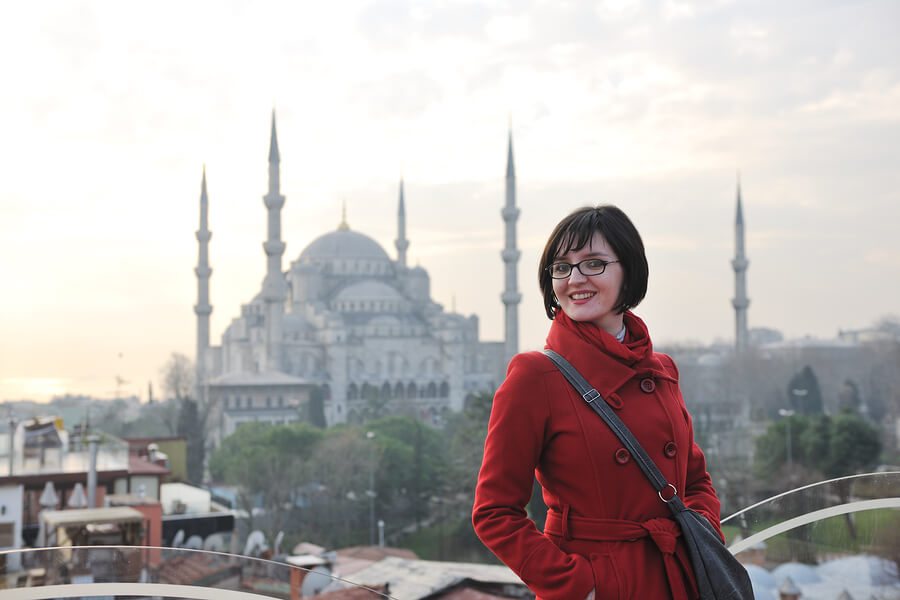WOMEN TRAVELERS
Foreign women, especially those traveling alone, attract significant attention in Turkey. Catcalls and other forms of verbal harassment are common; physical harassment is rare. Regardless of whatever signals a foreign woman intends to send, her foreignness alone may suggest a liberal openness to friendly or amorous advances. Because Western movies and TV often depict women as seductive sex symbols, female travelers are frequently perceived as likely sex partners. However, as long as women expect plenty of attention and take certain common sense precautions, there is no need for paranoia.
More touristed parts of Turkey—İstanbul, Northwestern Turkey, the Aegean mid Mediterranean Coasts, Cappadocia, and Ankara—may be more comfortable for women travelers, Female travelers in Anatolia, along the Black Sea, and in Eastern Turkey should be confident and experienced in developing-world travel.
DRESSING FOR SUCCESS
A lot of harassment can be avoided by dressing conservatively. Shorts, short skirts, tight T-shirts, and revealing clothes are unacceptable in all areas of Turkey, including İstanbul, except in the most touristy of Aegean and Mediterranean towns. Women traveling alone might want to avoid Mich threads even in the latter regions. Generally, the less you look like a tourist, I lie better off you’ll be. Carry a kerchief or scarf to cover your head in mosques and more conservative towns. Wearing a conspicuous wedding band may help prevent unwanted overtures. Some travelers report that carrying pictures of a “husband” or “children” is extremely useful to help document marriage status. Even a mention of a husband waiting back at the hotel may be enough to discount your potentially vulnerable, unattached appearance. Many women traveling in Eastern Turkey choose to wear the chadot – a traditional, full-length Muslim dress—to discourage unwanted attention.
ACCOMMODATIONS AND FOOD
Sometimes more expensive, slightly more upscale accommodations with single rooms are more secure for a woman traveling alone; however, cheap dorm-style accommodations arc often equally good and also can provide invaluable opportunities for meeting other travelers with whom In venture out after dark. Stick to centrally located accommodations to avoid solitary late-night treks or metro rides. For comfortable restaurants, look for establishments with the word “aile” (“family”) in their names. Although you’re free to sit wherever you choose, Turkish women and couples will always sit in the aile room, which tends to be furnished better than the men-only “main” room.
STREET SMARTS
On the street, avoid eye contact, and appear confident and directed. Consider approaching older women or couples for directions if you’re lost or feel uncomfortable. Customarily, Turkish women seldom walk outside alone, especially after dark. Always carry extra money for a phone call, bus, or taxi. Women and men usually do not sit next to one another on buses and dolmuş. To avoid insinuating interest in her driver, a female traveler should not sit in the front seat of a taxi. Hitching is never safe for lone women, or even for women traveling together. Choose train compartments occupied by other women or couples; ask the conductor to put together a women-only compartment if he or she doesn’t filter to do so first.
HARASSMENT
The best answer to verbal harassment is no answer at all; feigned deafness, sitting still, and staring straight ahead will do a world of good that reactions usually don’t achieve. Alternatively, you can attract attention and show your displeasure by making a scene, perhaps using the expression “ayıp!” (“shame!”). A phrase like “haydi git” (“go away”) may also come in handy. Don’t hesitate to seek out a police officer or a passerby if you are being harassed. Rape and other violence against women are still relatively new to ’Turkish culture, and their incidence is much more rare than in most Western countries. If unwanted attention becomes physical and/or threatening, you should yell, scream, and make getting away your first priority. In Turkish, holler “imdat” (“eem-DAHT,” help) or “polis” (“PO-lees,” police). Carry a whistle or an airhorn on your keychain, and memorize the emergency number (® 155). An IMPACT Model Mugging self-defense course will not only prepare you for a potential attack, but will also raise your confidence and your awareness of your surroundings .Women also lace some specific health concerns when traveling .
There are many benefits to traveling alone, including independence and greater interaction with locals. On the other hand, any solo traveler is a more vulnerable target of harassment and street theft. Lone travelers need to be well organized and look confident at all times. Try not to stand out as a tourist, and be especially careful in deserted or very crowded areas. If questioned, never admit that you are traveling alone, and maintain regular contact with someone at home who knows your itinerary.



Leave a Reply